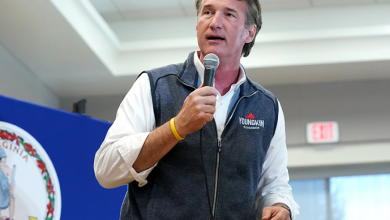Virginia’s Staunton community that faces food insecurity to battle this trend after two sisters launched a nonprofit called Jones Garden

The COVID-19 pandemic has had deep and far-reaching effects on every part of American life, including food insecurity. Millions of Americans are struggling to put food on the table because of the pandemic, which has caused a lot of people to lose their jobs, businesses to close, and economic uncertainty.
During the pandemic, many households’ sudden and severe loss of income is one of the most important things that has led to more food insecurity. With so many businesses going out of business and so many people being laid off, millions of Americans have suddenly lost their jobs and are struggling to make ends meet. Because of this loss of income, it is hard, if not impossible, for many families to buy healthy food.
This problem is made worse by the fact that many grocery stores have run out of certain items, especially at the beginning of the pandemic. Panic buying and hoarding caused stores to run out of essential food items and shelves to be empty, making it even harder for struggling families to get the food they need.
The pandemic has also caused problems in the food supply chain. Farmers are having trouble getting their goods to market, and transportation and distribution aren’t going as smoothly as they should. This has made more food go to waste and caused some foods to cost more.
Also, school closings and learning from home have had a big effect on children not having enough food to eat. Many students eat most of their meals at school, and when schools are closed or only open for a few hours, this means that many children don’t get these important meals.
Overall, the COVID-19 pandemic has had a terrible effect on food insecurity in the United States. It has affected millions of households and made existing differences and inequalities worse.
Several years ago, 1 in 7 people in Virginia’s Charles City County didn’t know where their next meal was coming from, but this scenario is becoming more frequent in many other areas across the state nowadays especially taking into consideration the negative effects of the pandemic. Michelle Johnson was the first to bring this issue to the public asking local and state officials to chime in and help these people in need.
“Years ago, I went to the Board of Supervisors and said, ‘Can we create a food pantry, because people are in need?’” she recalled.
Johnson’s tireless efforts to tackle the issue of food insecurity in Charles City County fell on deaf ears, despite her prominent position as county administrator and influence with local leaders. However, the outbreak of the pandemic in 2020 brought the gravity of the problem into sharp focus, prompting the board chairman to reach out to Johnson in a moment of realization and declare, “Miss Johnson, we need to act.”
Tragically, Charles City County remains a food desert, with a population of approximately 6,900 deprived of even a single grocery store. Undeterred, Johnson’s unwavering perseverance and sheer grit have paid off in a big way, as the county has now joined forces with a local non-profit to create the first permanent food pantry in the region.
The food pantry not only addresses immediate needs but also empowers the community through the inclusion of a community garden where residents can grow their own produce. Johnson envisions the garden as a transformative resource, equipping individuals with the essential skills and knowledge necessary to cultivate food in their own backyards. “This food pantry is much more than a mere safety net,” she affirms. “It is a beacon of hope for our community, a symbol of resilience in the face of adversity, and a model for rural Virginia.”
The situation in Charles City County sheds light on the problems of food access and equity that plague many rural communities, and some urban ones too. “The food system is an economic system, a cultural system,” said Kim Niewolny, executive director of the Center for Food Systems & Community Transformation at Virginia Tech.
The workings of market forces, although often seen as a boon to economic growth, can unfortunately lead to disparities and inequities, as exemplified in Charles City County. Despite the pressing need for a grocery store in the region, major chains have shown little interest in establishing a presence, citing factors such as insufficient car traffic as a disincentive.
According to a study on food deserts conducted by Virginia Tech and Virginia State University, across the state of Virginia, an unsettling trend has emerged: many communities suffer from a lack of access to healthy food options, while fast-food restaurants and convenience stores proliferate. This disparity leaves residents with limited options for fresh fruits and vegetables, which are essential components of a nutritious and balanced diet.
This issue has far-reaching implications, as inadequate access to healthy food is a major contributor to a host of health problems, including obesity, heart disease, and diabetes.
“Whose knowledge gets to inform how we eat?” Niewolny asked. “Whose knowledge gets to inform how we produce food? We can’t use the same tools that we’re using now to change the system. We actually need a different imagination.”
“I grew up gardening with my family, so I always enjoyed gardening,” said Naomi Jones, a woman who recently started the Jones Gardens with her sister, a Staunton nonprofit that creates community garden parks on abandoned or unused plots of land. “Just seeing the beauty of vegetable plants, I thought it would be really cool to do a garden that really showcases that. And my mom always wanted to make sure we had good nutritious food to eat.”
Perplexed by the decision not to sell their crops at the local farmers market, some have queried the rationale behind this strategy. In response, Naomi, a prominent farmer in the area, offers a compelling explanation: “Many of our neighbors work tirelessly during the week and are unable to attend the farmers market, which typically operates on weekends. We recognized this gap in the market and seized the opportunity to create an evening market that caters to their needs.”
By establishing this innovative solution, Naomi and her fellow farmers demonstrate a deep commitment to their community, recognizing that local residents are the backbone of their business. Rather than simply exporting their produce to other markets, they are dedicated to building a robust local economy that benefits everyone involved.
This approach represents a model of sustainability and environmental stewardship, as it promotes the consumption of fresh, locally-grown produce and minimizes the carbon footprint associated with transporting food over long distances.
All in all, Naomi’s vision and leadership highlight the power of community-driven solutions, which prioritize inclusivity, accessibility, and sustainability. In doing so, they inspire us to reimagine the possibilities of agriculture and local commerce in the modern era.




